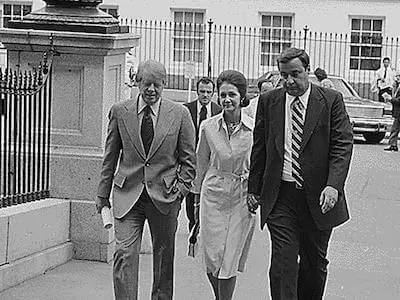If something is working adequately well, leave it alone.
If it ain’t broke, don’t fix it
What's the meaning of the phrase 'If it ain't broke, don't fix it'?
What's the origin of the phrase 'If it ain't broke, don't fix it'?
Humans seem to have the urge to improve things. Prehistoric hand-axes were made by repeatedly chipping small flakes off pebbles of flint with other hard objects. Million-year-old examples of these have been found that give the impression of being ruined by being chipped just one time too many. That pang of regret we have probably all felt after spoiling something by adding that unnecessary final touch was first faced by Ugg in his cave.
The thought may be Stone Age but the phrase ‘if it ain’t broke don’t fix it‘, which sounds as though it might come from the Roosevelt or Truman era, is more recent than that. This one is widely attributed to T. Bert (Thomas Bertram) Lance, the Director of the Office of Management and Budget in Jimmy Carter’s 1977 administration. He was quoted in the newsletter of the US Chamber of Commerce, Nation’s Business, May 1977:
Bert Lance believes he can save Uncle Sam billions if he can get the government to adopt a simple motto: “If it ain’t broke, don’t fix it.” He explains: “That’s the trouble with government: Fixing things that aren’t broken and not fixing things that are broken.”
Lance certainly did popularise the term but it seems to have been a colloquial phrase in the southern states of the USA before his celebrated use of it; for example, this piece is from the Texas newspaper The Big Spring Herald, December, 1976:
“We would agree with the old Georgia farmer who said his basic principle was ‘If it ain’t broke, don’t fix it.'”
Several correspondents from the southern states of the USA have commented that they recall the phrase from well before 1977 – some saying the 1930s. That may be misremembering (which is commonplace in the dating of recently coined phrases) or it may be that the phrase existed in common parlance but not in print. It would be surprising for a phrase to exist in the spoken language for the best part of 50 years before it appeared in print. The Internet has changed the way that new coinages spread and these days a datable record of a new phrase will be apparent within a day or two. Even in the days of newsprint, 50 years is hard to swallow. Here is an barchart of the hits that a search for ‘if it ain’t broke, don’t fix it’ finds in an very large archive of 20th century newspapers:
I would suggest that the notion and possibly a variant of the phrase may well have been around for some time before the 1970s, but that the present-day wording of the phrase began then.
George Bernard Shaw’s ‘two countries divided by a common language’ comes into play here. The phrase has to be American. In England things don’t get broke, they get broken. I know that ‘ain’t broke’ is intended as a knowing southern yokelism, as opposed to ‘proper’ American, but it is one that wouldn’t have originated anywhere else.
<grumpy old man mode>When US websites ask ‘Forgot Your Password?’ I always mutter “No, but I have forgotten it”.</grumpy old man mode>
In a few short years, ‘if it ain’t broke, don’t fix it’ has, even in the UK, become so established a part of the language as to have become a cliché, which is an unusually quick ascent and descent. Nevertheless, it’s a close call as to whether Lance is now best remembered as coining that phrase or for William Safire’s pithy description of him as ‘Carter’s broken Lance’ after his resignation in 1977, following the Calhoun National Bank corruption scandal.
See also: the List of Proverbs.
The history of “If it is not broke” in printed materials
Trend of if it is not broke in printed material over time
Related phrases and meanings
Browse more Phrases
About the Author

Phrases & Meanings
A-Z
A B C D E F G H I J K L M N O P Q R S T UV W XYZ
Categories
American Animals Australian Bible Body Colour Conflict Death Devil Dogs Emotions Euphemism Family Fashion Food French Horses ‘Jack’ Luck Money Military Music Names Nature Nautical Numbers Politics Religion Shakespeare Stupidity Entertainment Weather Women Work
How did we do?
Have you spotted something that needs updated on this page? We review all feedback we receive to ensure that we provide the most accurate and up to date information on phrases.
